Books
Books

Radical Love
Radical Love gathers five of Fanny Howe's novels: Nod, The Deep North, Famous Questions, Saving History, and Indivisible, previously out-of-print and hard to find classics whose characters wrestle with serious political and metaphysical questions against the backdrop of urban, suburban, and rural America.
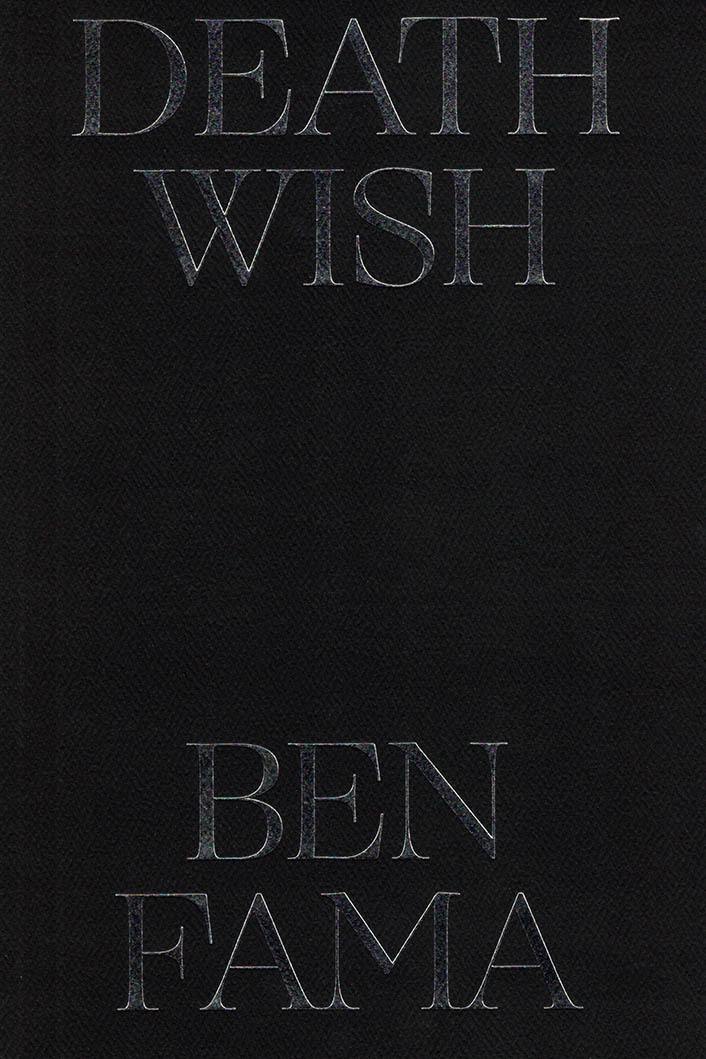
Death Wish
Ben Fama's DEATHWISH drops us back into the beauty and the fantasies teased out in his first book of poetry, FANTASY, re-braiding them through BDSM scenarios, metaphysical inquiries, and the maximalism of the contemporary.
Ben Fama is a writer based in New York City. He is the author of DEATHWISH (Newest York Arts Press, 2019), FANTASY (Ugly Duckling Presse, 2015), and the chapbooks Odalisque (Bloof, 2014), Cool Memories (Spork, 2013), New Waves(Minutes Books, 2011), and Aquarius Rising (Ugly Duckling Presse, 2010). He is also the author of the artist book Mall Witch (Wonder, 2012). He is the co-founder of Wonder.
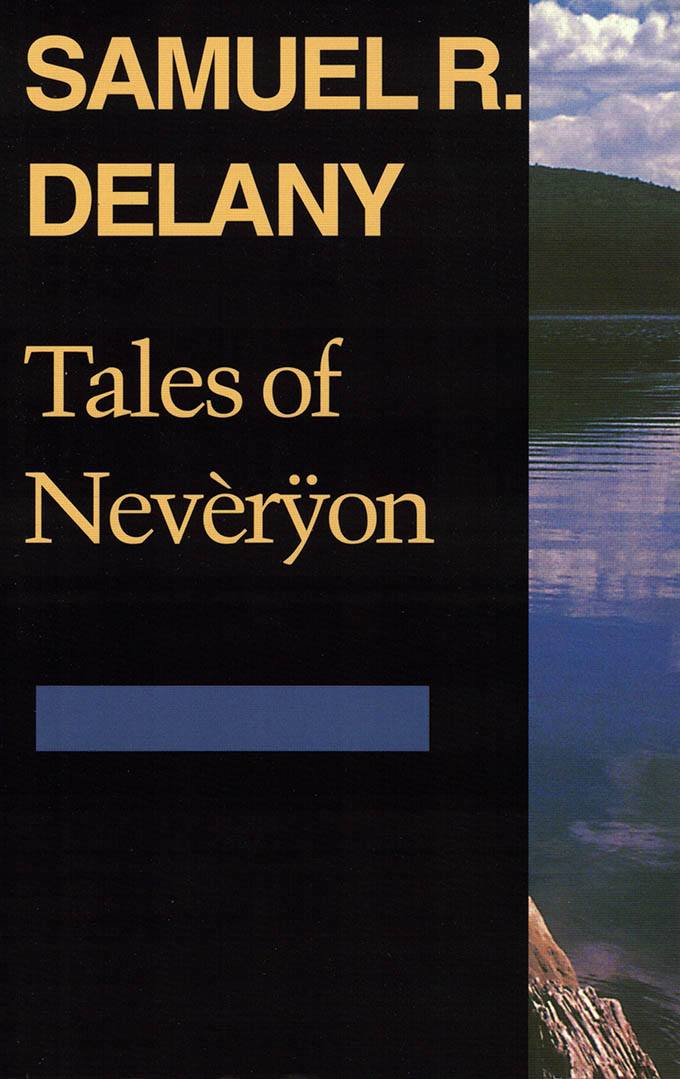
Tales of Nevèrÿon (Return to Neveryon, Book 1)
The eleven stories, novellas, and novels in Return to Nevèrÿon's four volumes chronicle a long-ago land on civilization's brink, perhaps in Asia or Africa, or even on the Mediterranean. Taken slave in childhood, Gorgik gains his freedom, leads a slave revolt, and becomes a minister of state, finally abolishing slavery. Ironically, however, he is sexually aroused by the iron slave collars of servitude. Does this contaminate his mission — or intensify it? Presumably elaborated from an ancient text of unknown geographical origin, the stories are sunk in translators' and commentators' introductions and appendices, forming a richly comic frame.
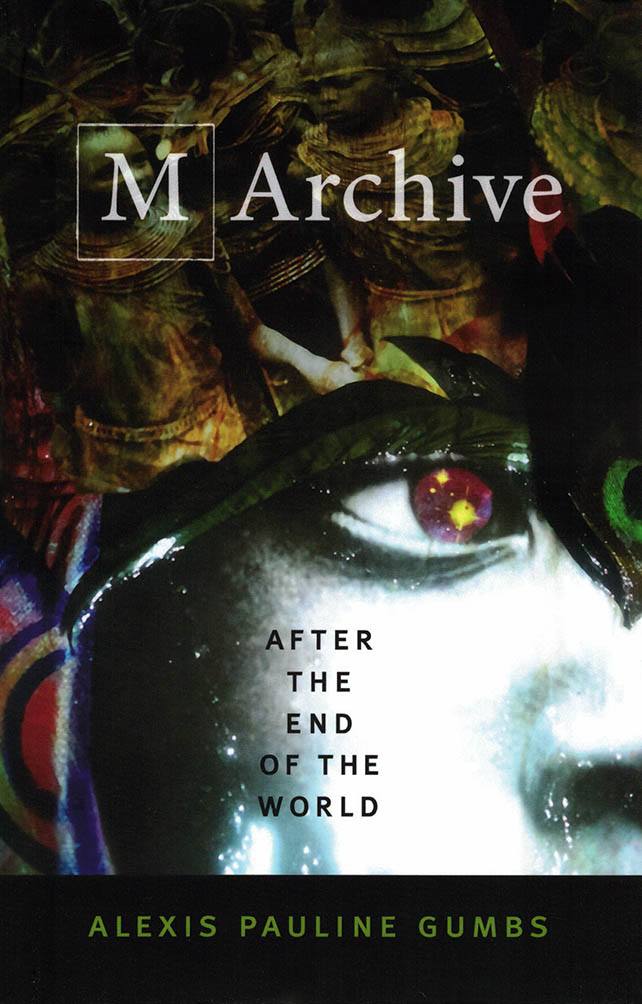
M Archive: After the End of the World
Following the innovative collection Spill, Alexis Pauline Gumbs's M Archive, the second book in a planned experimental triptych, is a series of poetic artifacts that speculatively documents the persistence of Black life following a worldwide cataclysm.
Engaging with the work of the foundational Black feminist theorist M. Jacqui Alexander, and following the trajectory of Gumbs's acclaimed visionary fiction short story "Evidence," M Archive is told from the perspective of a future researcher who uncovers evidence of the conditions of late capitalism, antiblackness, and environmental crisis while examining possibilities of being that exceed the human.
By exploring how Black feminist theory is already after the end of the world, Gumbs reinscribes the possibilities and potentials of scholarship while demonstrating the impossibility of demarcating the lines between art, science, spirit, scholarship, and politics.
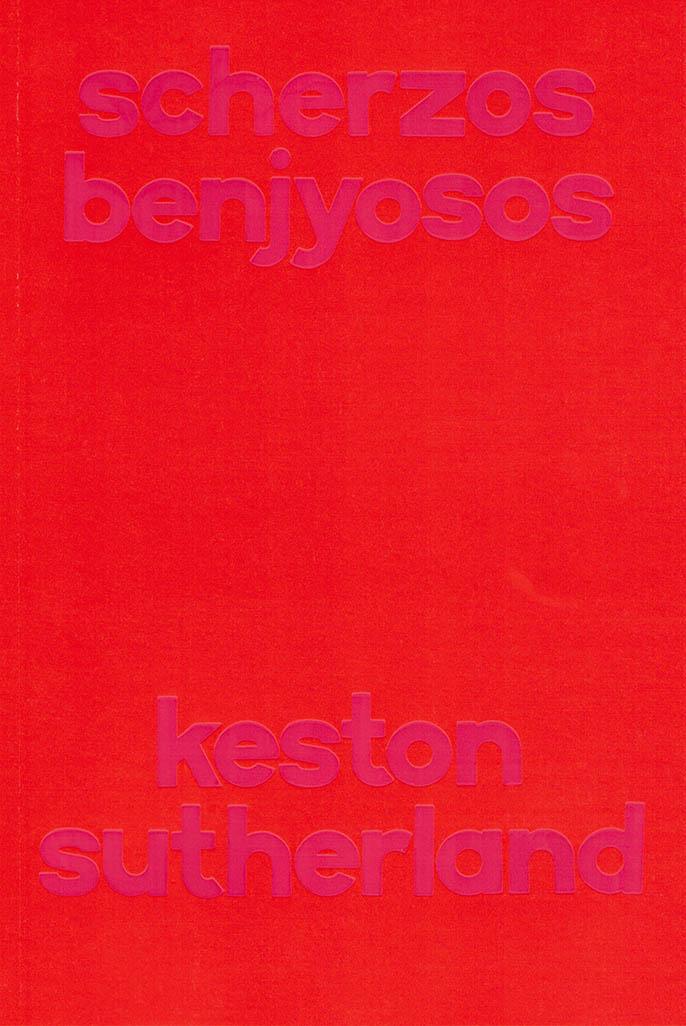
scherzos benjyosos
Scherzos Benjyosos is a set of four poems, scherzos in prosimetrical blocks, a comical, wild, and delirious sifting through the carnage of the financial crash, the dreamscapes of capitalist infancy, histories of sadism and persecution, the fetish bars of canonical literature, and the psychoanalysis of grass. The book also includes “Sinking Feeling,” Sutherland’s long poem from 2017, described by J. H. Prynne as “breathtakingly lovely, and desperate, racked with desire to become truthful love.”
Some reviews of other books by Keston Sutherland:
“[Hot White Andy] is the most remarkable poem in English published this century… A possible poetic future starts here.” — Jacket Magazine
“The most unsettling but also authentically hopeful account of what it is to be human now.” —3AM on The Odes to TL61P
“Immediately takes its place among the most essential works of literature in English in this new millennium.” — Chicago Review on Poetical Works 1999 –2015
“[‘Sinking Feeling’] moves like a piece of music through recursive and repeated moments, shifting and developing its described and conceptual spaces, its logics of representation, and its narrative. The thinking it follows is not always easy, but the disorienting effect on the reader is exhilarating because of the intellectual and emotional space it opens up as you try to follow it.” — London Review of Books
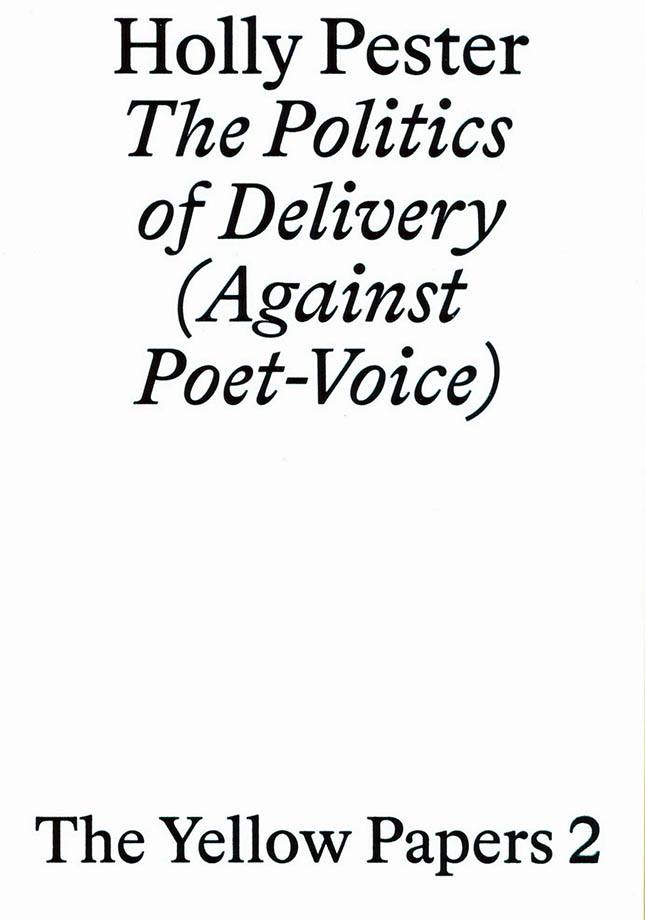
The Politics of Delivery (Against Poet-Voice)
An essay by Holly Pester on prosody, “poet-voice,” and the politics of delivery.
“Following a political impulse that I cannot shake, I want to oppose poet-voice. Not to smirk, but to suggest that poet-voice, that is, to lay a given mutual voice on top of the text, is a kind of opting out. It’s a self-absolving move. What’s being opted out of is the rough stuff of delivery and the ethical shrapnel in intonation. Such materials of poetic intonation are not, I will argue, irrelevant to the political questions of one’s speech in society and its disputed freedoms.
I have a fully felt and fraught relationship with delivery. I care about delivery compositionally; I enjoy the effects of composition working on and into my voice. Sometimes it feels as if my voice is the victim of some impossible contract with the text. The effort and timbres of delivery are therefore potentially very significant to a political poet. This sounded aspect of my work often gets short-handed as performance, but it’s not that. Performance art and performance poetry are distinct art forms with histories and styles, learned and studied by talented performers. Delivery is as banal or as eccentric as the material, but not necessarily correspondingly. It is part of the craft of poetry that isn’t unrelated to the intrinsic vocal identity of the poet (accent, etc.) yet has as much to do with tensions within the communities, heritages, and civics of poetry as with the individual. ”
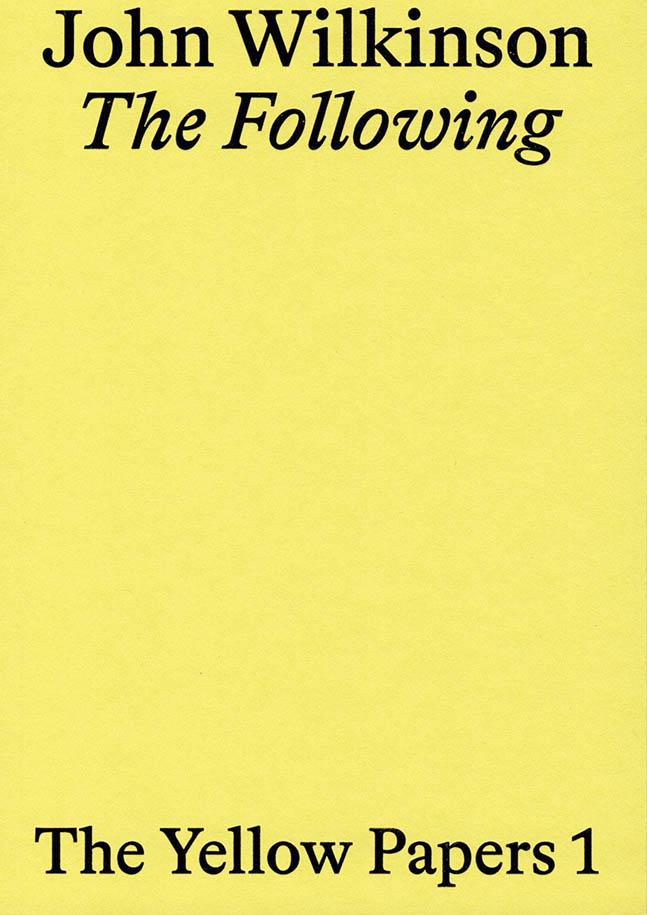
The Following
The Following selects from John Wilkinson’s essays of the last three decades, with a preference for what has come to be known as creative criticism, and adds a new essay on reflected boughs in poems by Shelley and a photograph by Sally Mann, and a poem in homage to Sean Bonney. The book’s title is a broken reflection of the essay title “Following the Poem.”
“Through following a poem (not just any poem), a reader can become involved in the evocation and enactment of a radical hybridity, pulling together ways of thinking about the world modernity has categorically but falsely separated; but such reading takes place in time, so continuously a reader unpicks and reintegrates elements of the poem in a felt motion which can restore a healed and full being in the world, involving in its fullness and as a condition of it, the detours, the lapses, and the breaks in his or her journey.”
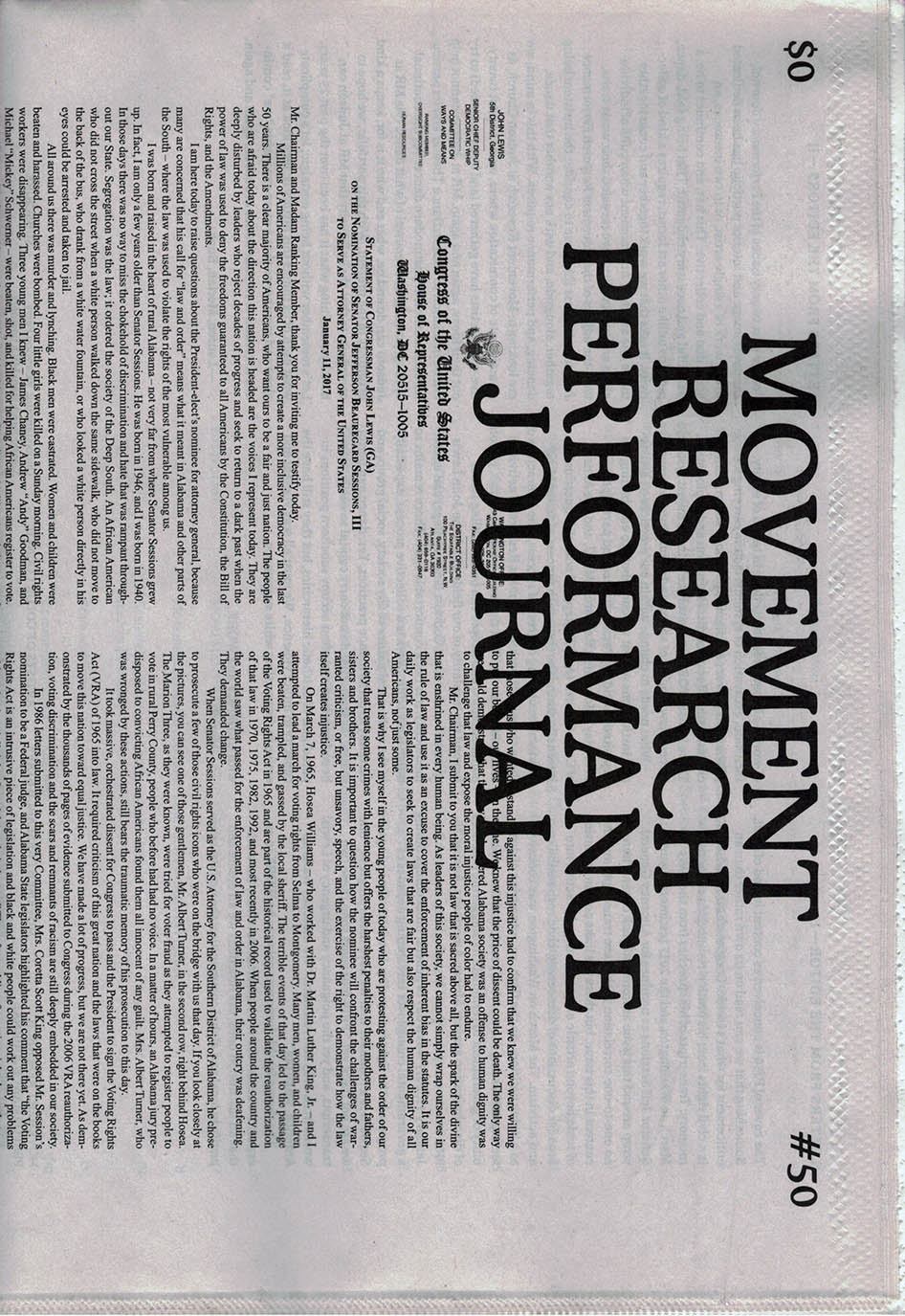
Movement Research Performance Journal
Movement Research Performance Journal (Archive)
Different archive editions of the journal available to consult in our space (not for sale). With editions ranging all through the history of the journal.
Available editions :
#03
#05
#14
#15
#19
#20
#22
#26
#50

Movement Research Performance Journal
Movement Research Performance Journal #52/53
Movement Research announces Issue 52/53 of its print publication, the Movement Research Performance Journal. For this issue, Sovereign Movements: Native Dance and Performance, guest editor, choreographer Rosy Simas invited writer, Ahimsa Timoteo Bodhrán, to work with her. Together they assembled contributors from Native and Indigenous communities to reflect upon their practices, the historical conditions out of which they operate as well as movement, performance, and choreography as a socio-political project. Just as it is important for physical institutions to acknowledge that they sit upon occupied land of Native and Indigenous people, so too must institutions of history, practice, and epistemology acknowledge their occupation of knowledge and memory.
Throughout this issue, dance and movement is posited as a powerful strategy against settler-colonial mindsets and as an effective tool against erasure of Native and Indigenous cultural traditions. These pages discuss the importance of Native sovereignty and analyze various histories of resistance to settler-colonialism. Artists in the issue propose alternative artistic models to probe the roles of art and artists in society towards a more expansive constellation that fundamentally critiques the Western reward system in culture as well as the often celebrated cult of authorship.

Movement Research Performance Journal
Movement Research Performance Journal #54
Movement Research announces Issue 54 of its publication, the Movement Research Performance Journal. Continuing to experiment with approaches that engage contemporary choreography and performance through the medium of print—poem, prose, image, interview and a wide range of formats give form to critical and self-reflexive discourses and material histories. Movement Research Performance Journal acts as a site of convergence between publication, editors, writers, designers, and artists to consider the place of dance, performance, and choreography in relation to the contemporary moment.
For MRPJ54: Spatial Practice, guest editor, artist Alan Ruiz invited contributors to examine the ongoing legacy of neoliberalism and the cultural production it engenders, specifically focusing on the relation between bodies and the built environment. Contributors have explored the contexts and histories in which we dwell, create, and coexist to interrogate how space is produced both as material and ideology during the hyper-development and hyper-exploitation of the urban environment, predominantly in New York City. Spatial Practice asks: how does this impact the bodies that labor and move to keep the kinetic machine of “progress” moving? Contributions offer multiple perspectives—through a variety of genres—on the ways in which the political project of neoliberalism has, in part, shaped the designation and use of public space as well as enthroned the philanthropic class and the cultural institutions associated with them. Alongside the consolidation of wealth and power, neoliberalism’s underlying insistence on individualism has also reinforced and normalized the braided conditions of capitalist exploitation, structural racism, and patriarchal domination. Unraveling this logic allows us to collectively imagine alternatives to the prevailing systems of property, dispossession, ableism, and incarceration that parcelize existence.
Contributions from:
Critical Resistance, Alan Ruiz, Lluís Alexandre, Casanovas Blanco, Julie Tolentino and Sadia Shirazi, Kaegan Sparks, Martha Rosler, Suzanne Stephens, Joshua Lubin-Levy, Lo-Yi Chan and Tim Hartung, Olive McKeon, Alice Sheppard, Biba Bell, Erik Thurmond, BRANDT : HAFERD, V. Mitch McEwen and Olivier Tarpaga, Sarah Oppenheimer, Jimmy Robert and Mario Gooden, Dominic Cullinan, Angela Davis J. Bouey and Melanie Greene, Lisa Nelson, Diana Crum, Kristopher, K.Q. Pourzal, Jess Barbagallo, John Hoobyar and Simon Asencio, Layla Zami, Cristiane Bouger, Daria Faïn and Marjana Krajač, Germaine Acogny, Helmut Vogt and André Zachery, Milka Djordevich and Tim Reid, Melanie Maar.

Schismatics
Schismatics consists of 10 short stories, in a fictitious way dealing with forgotten historical personas. Among them, artist Goda Palekaitė includes Mary Anning –– an amateur discoverer of dinosaurs, Emanuel Swedenborg –– a mystic who empirically explored the architecture of heaven, and Essad Bey –– a Jewish-Muslim writer and orientalist. Here their lives are revived and balance between the lines of history and story.
The book fuses elements of fiction, academic writing, and artistic research, and intertwines with rumors, forgeries, and inventions. Previously, its characters and narratives have already appeared in Palekaitė’s performances and installations, which are presented in the middle of this bilingual edition. In the introductory essay, Valerio Del Baglivo analyses the author’s exploration of facts and fiction, the mechanisms of knowledge production, and the trans-chronological perception of time. At the end of the book, Monika Lipšic ‘Riddle’ reflects on a ‘schismatic poetics’.
Goda Palekaitė is a contemporary artist and researcher whose work combines visual, literary, performative, and anthropological practices. Exploring the politics of historical narratives, the agency of dreams and collective imagination, and social conditions of creativity, her work evolves around long-term projects that manifest as performances, scenographies, installations, and texts. Her performances, solo and group shows are being presented internationally. In 2019 Goda Palekaitė received The Golden Stage Cross and the Young Artist’s Prize for her artistic contributions across disciplines.
Published September 2020
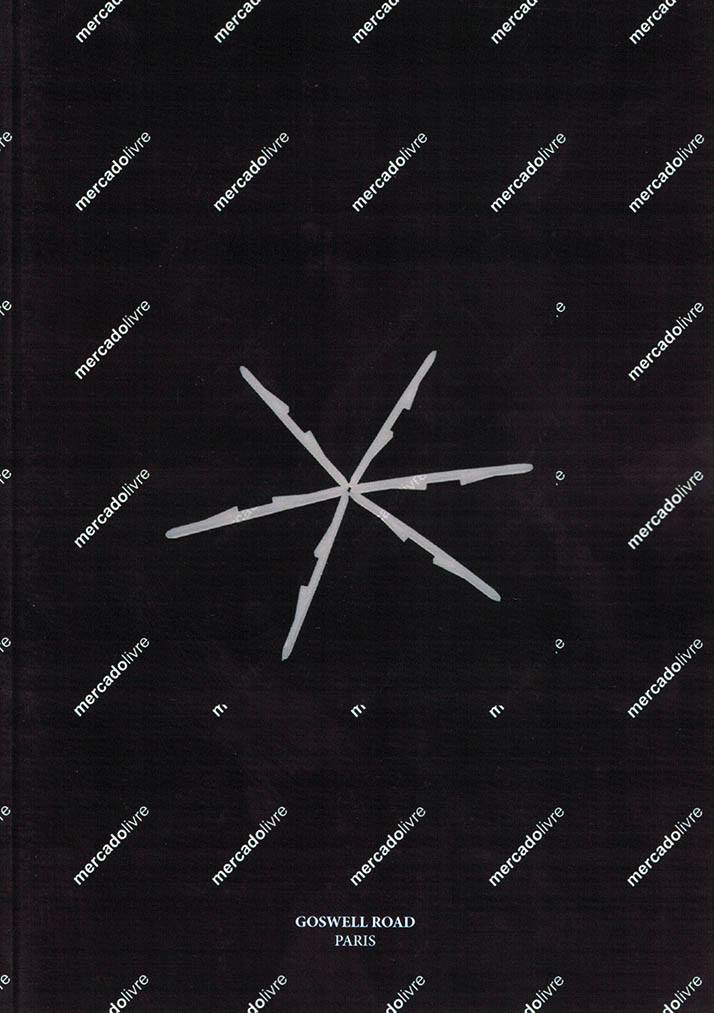
Mercado Livre
Wisrah Villefort’s overarching research focuses on the nonhuman, digital matter, synthetic polymers, prosthetics and their markets.
The ongoing hypermedia work Mercado Livre begun in 2017, is dependent on the viewer performing online, accessing the platform via Instagram. Villefort collects images from online marketplaces based in the Global South, outside of the West, including AliExpress (China) and Mercado Livre (Argentina) for the content. Mercado Livre, besides being the title of the work and the platform, is also the term for the neoliberal principle of the “free market”, in which goods’ prices supposedly regulate themselves.
This book accompanies his exhibition, THE MOUTH OF THE GIFTED HORSE, dissecting Mercado Livre through the eyes of the show, focussing on inter-species relationships and non-human prosthetics, featuring a text written by Villefort during his recent research residency at Pivô, São Paulo, entitled 'Notes on Masks, Gloves and Muzzles: Beyond the Fault of Epimetheus'.
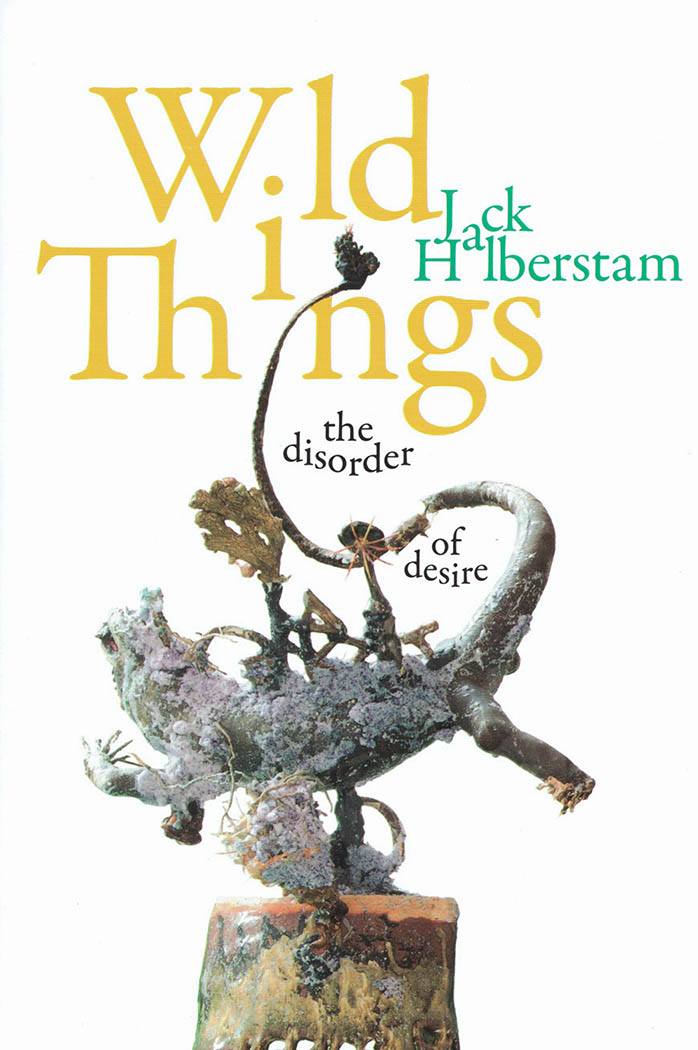
Wild Things: The Disorder of Desire
Halberstam offers an alternative history of sexuality by tracing the ways in which the wild, a space located beyond normative borders of sexuality, offers sources of opposition to knowing and being that transgress Euro-American notions of the modern subject.
"WILD THINGS is queer theorist Jack Halberstam's account of sexuality in general, and queerness in particular, after nature. As the heterosexual/homosexual binary emerged in the late 19th-century and coalesced in the 20th-century, discourses of both heterosexuality and homosexuality defined sexuality in relation to nature and the natural world. The most well-known is the homophobic framing of homosexuality as unnatural, aberrant, and "against" nature, but of equal importance is the 19th-century male dandy's positioning of artifice and camp-and through it homosexuality-as anti-natural. On the other hand, heterosexuality was often held up as the "natural" sexuality and, later in the 20th-century, gay scientists tried to prove that homosexuality was a natural, biological desire.
In this book, Halberstam mobilizes wildness as an analytic through which an alternative history of sexuality and desire outside of heterosexuality, homosexuality, and taxonomical classifications can emerge. To that end, Halberstam turns back to the orderly, taxonomical, and classified homosexuality and heterosexuality of the 19th and 20th-centuries and asks: what embodiments and desires were swept under the carpet in the process of creating identitarian sexualities?
Halberstam claims these excluded and unruly figures as "wild" lives lived out in embodiments and desires which eluded the orderly classifications of their era. Wildness, for Halberstam, thus becomes a way to claim an "epistemology of the ferox," a way of being and knowing in the world which is not the opposition of order but order's absence: a force which "disorders desire and desires disorder."
Although he is clear that wildness and queerness are not interchangeable, Halberstam sees in wildness and "wild thought" queer theory's anti-identitarian impulse to explore life outside of the limits of the human and liberal governance. More than just a project of recuperating queer figures lost in the archive, Halberstam's WILD THINGS argues for a revision of queer history, one in which "nature" and the "natural world" does not function as that which sexuality defines itself with and against"
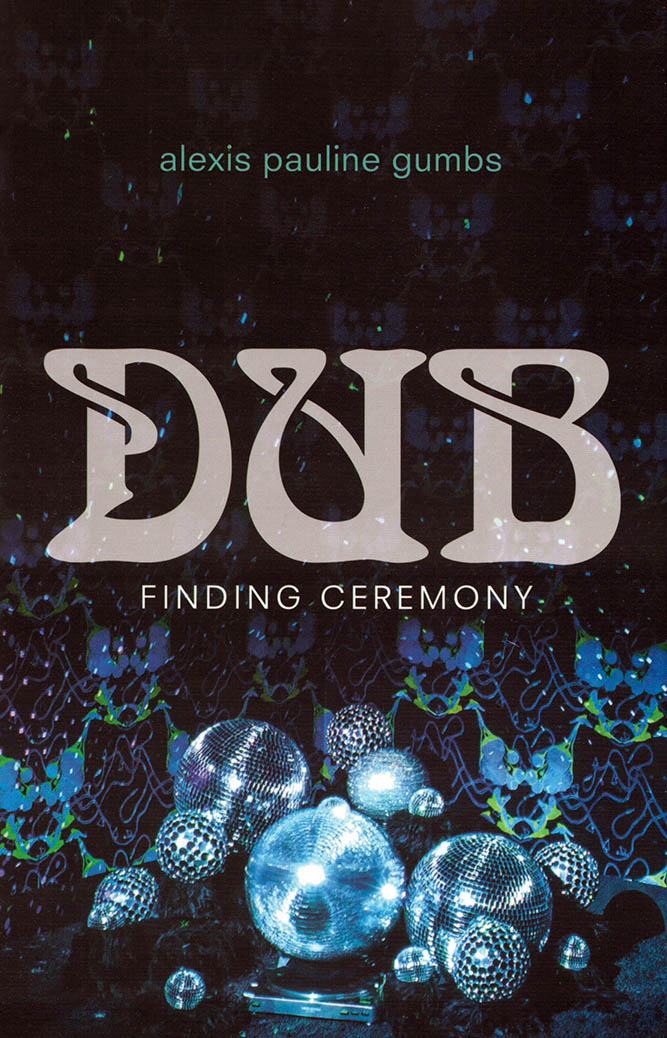
DUB
Dub: Finding Ceremony takes inspiration from theorist Sylvia Wynter, dub poetry, and ocean life to offer a catalog of possible methods for remembering, healing, listening, and living otherwise.
"In DUB Alexis Pauline Gumbs continues with the third book in her poetry series, the first two books being Spill, inspired by Hortense Spillers, and M Archive, inspired by Jacqui Alexander. Whereas Spill deals with the contemporary afterlives of slavery and M Archive describes the post-dated evidence of our imminent apocalypse, DUB destroys Gumbs' own origin story, as she questions the assumptions and histories she has held onto most of her life. This text, through engagement with Sylvia Wynter's rigor, reinvents language outside of personal histories.
DUB is organized into topical sections, where spacious prose poems animate the voice of an underwater chorus in ceremonies that flow into one another. Beginning a daily writing practice, Gumbs wrote DUB based on moments of emphasis in Sylvia Wynter's essays (and one interview over several decades).
This book is influenced by the promiscuity and prolificity of dub music, the confrontational home-grown intimacy of dub poetry, and the descendants of this work. Dub uses the impact of repetition and the incantatory power of the spoken broken word. Gumbs uses dub to emphasize that Sylvia Wynter learned every colonial language and came to the conclusion that the ways of thinking that made colonialism and slavery imaginable were constructed over time and heretical to the ways of thinking that came before them; and so it must be possible to construct ways to understand life and place differently now as well.
Gumbs goes back to the origin stories that precede her and turns the blood into paint, emphasizing that "then" is also "now" through the broken and intense voices of ancestors. Inspired by Wynter's heretical poetic action against our deepest beliefs, DUB is an artifact and tool for breath retraining and interspecies ancestral listening.
Throughout the text, listening includes speakers who have never been considered human: whales and algae. Gumbs is attentive to kindred beyond taxonomy, questioning kinship loyalty, and suggests that our perceived survival needs are responses to a story we made up and told ourselves was written by our genes, a story that can be changed. This book will be of interest to scholars of African-American studies, diaspora studies, feminism, queer theory, English, creative writing and poetry"
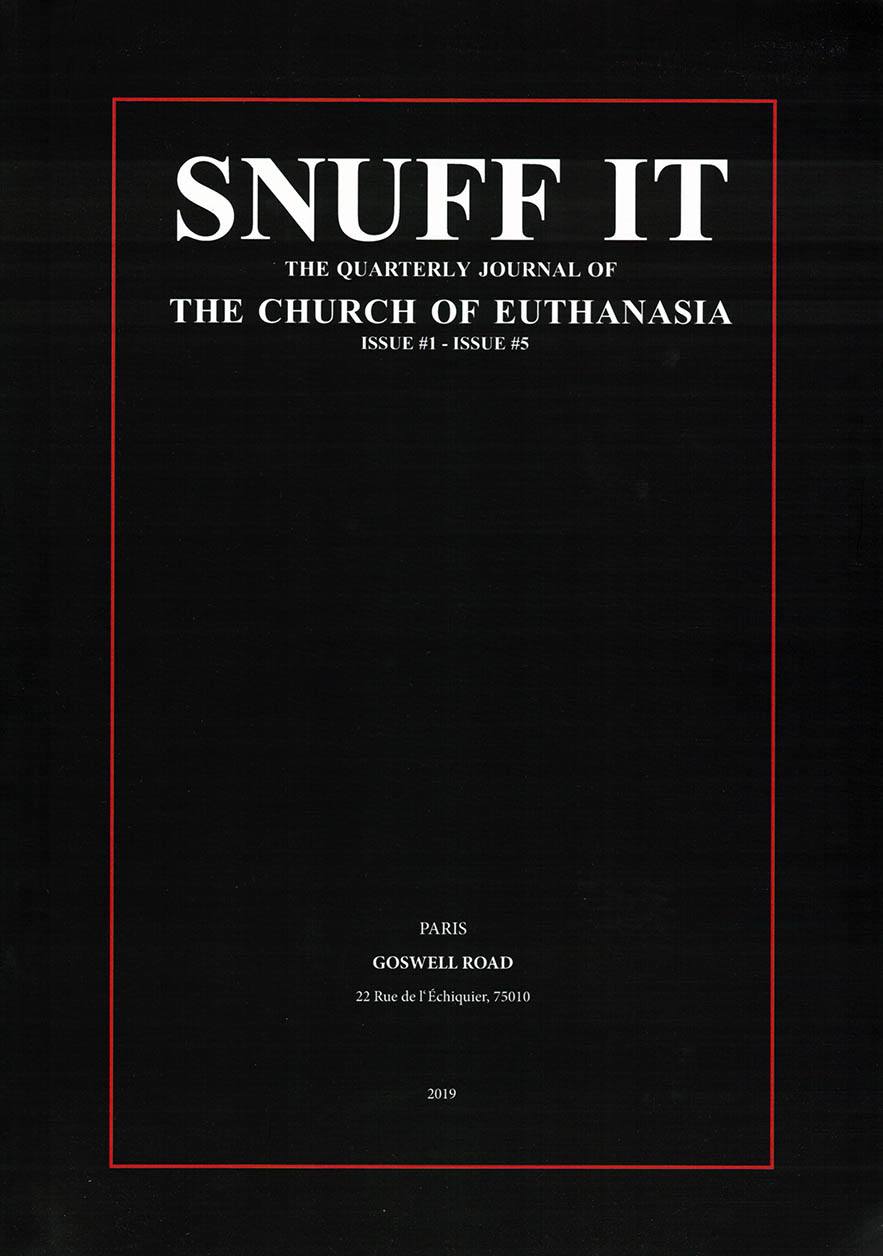
SNUFF IT
In June 1994, the Church of Euthanasia published the first issue of SNUFF IT subtitled 'The Quarterly Journal of The Church of Euthanasia'. On the back cover was a simple claim: "Get six issues of Snuff It for only ten dollars!" though, to this day, the CoE has only produced five issues. What SNUFF IT lacks in punctuality is more than made up for its content. The first four issues were produced between 1994 and 1997, the period when the dada actions of CoE were at their peak. ISSUE #5 had to wait over 20 years to see the light of day, but the CoE capitalised on this, giving us a taste of what it means to them to be Post-Antihuman.
Gathered here for the first time are all five issues of SNUFF IT and some closing words from the Reverend Chris Korda on the evolution of the CoE during its 27 years of existence.
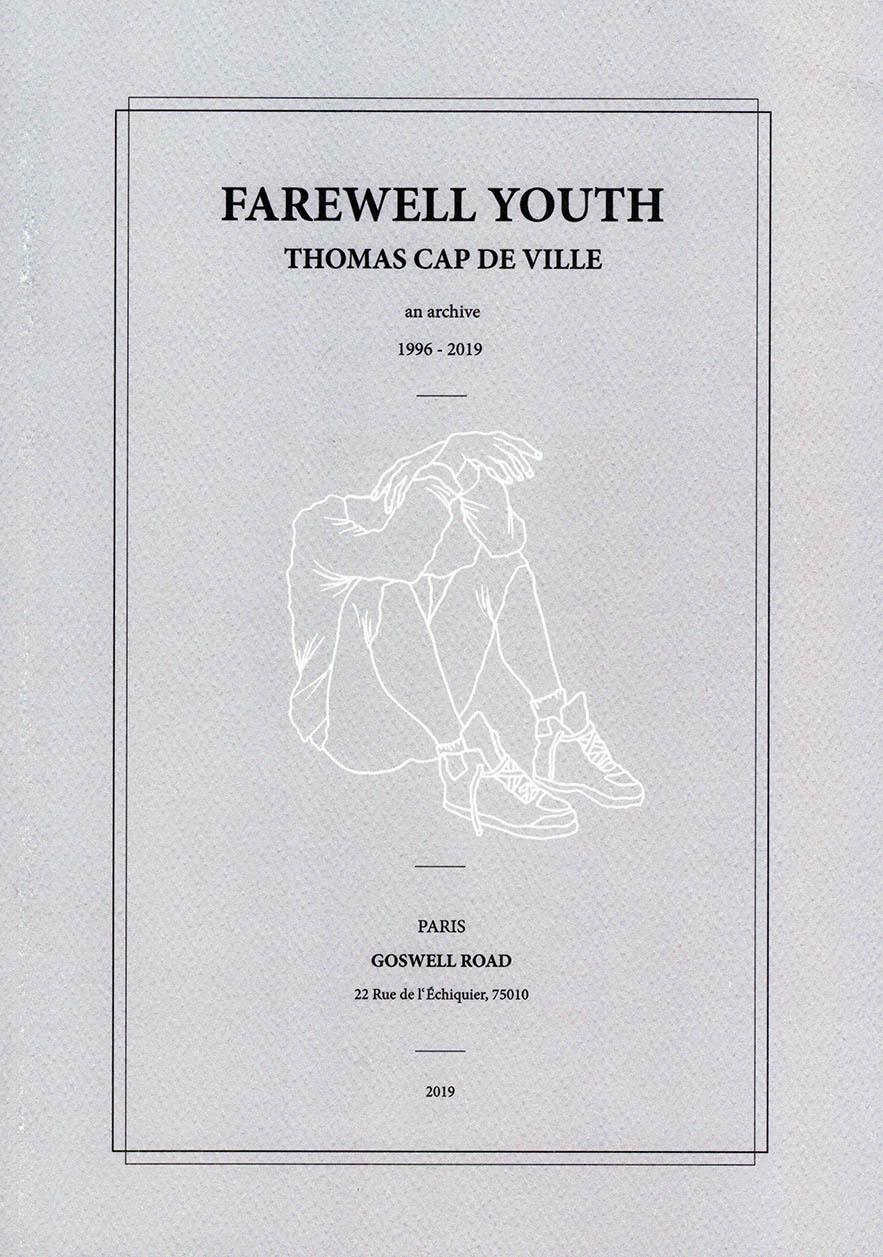
Farewell Youth: An Archive 1996-2019
Cap de Ville was a child of the nineties and noughties. The extracts from the works contained in this volume are a personal testament to this time, to his time. He refers to these book-objects as 'psychophores': they contain hair, theeth and bodily fluids, alongside collected objects, talismans, detritus, and personal photographs, all conserved in transparent adhesive tape. His archive covers the years from 1996-2019 (the year the book-objects were assembled) without clear indicators of time passing or time stamps. It remains defiantly out of time.
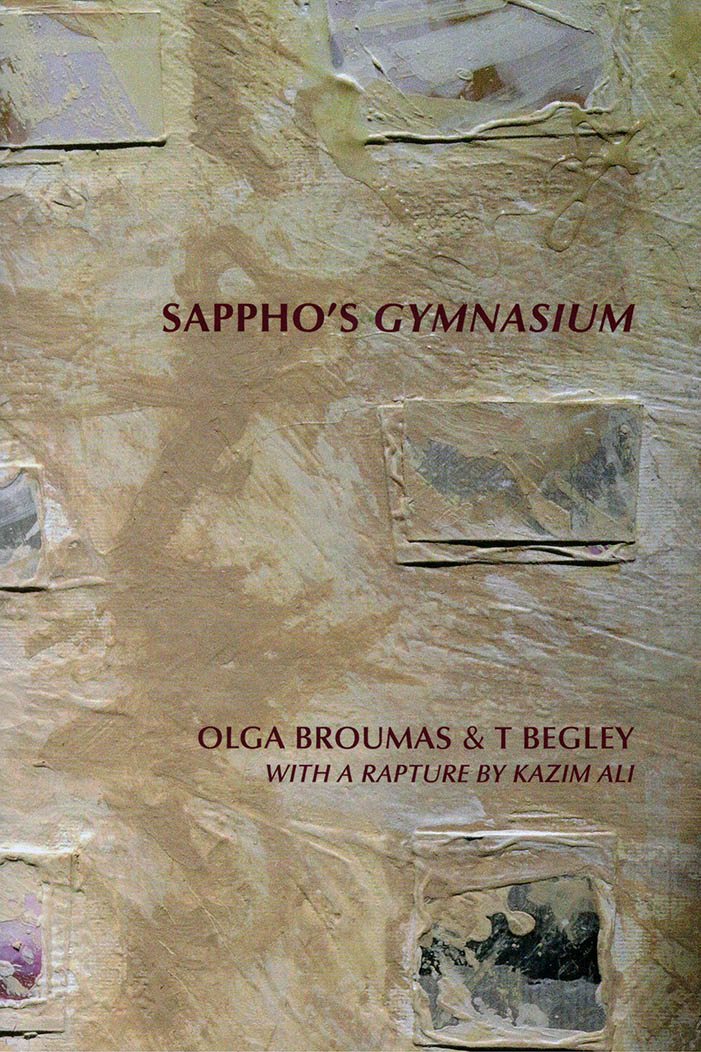
Sappho's Gymnasium
Written and arranged in an experimental mode akin to music or choreography, these fragmented lyrics create space and resonance honoring the physical splendor of both the body and the poem. This new edition includes several new poetic sequences and an extended essay.
OLGA BROUMAS is a poet, translator, and professor at Brandeis University. Her books include Beginning with O, a Yale Younger poets selection; Rave: Poems 1975-1998; Perpetua; and two translations of Odysseas Elytis. T BEGLEY is a poet and translator living in Arizona. KAZIM ALI is a poet, essayist, novelist, and translator.

Forlaget emancipations frugten
Wet With Dew
Text by Eleanor Ivory Weber
Published by Forlaget emancipa(t/ss)ionsfrugten
Edited and produced by Eller med a △ Åbäke
Edition: 200 ex.
Format (b*h): 20 * 26,5 cm
Pages: 48 sider
Print: Grafiche Veneziane
Paper: Munken Pure 170g
Typeface: Base12 by Zuzana Licko
More info at https://www.cecilieskov.com/Works/Wet-With-Dew
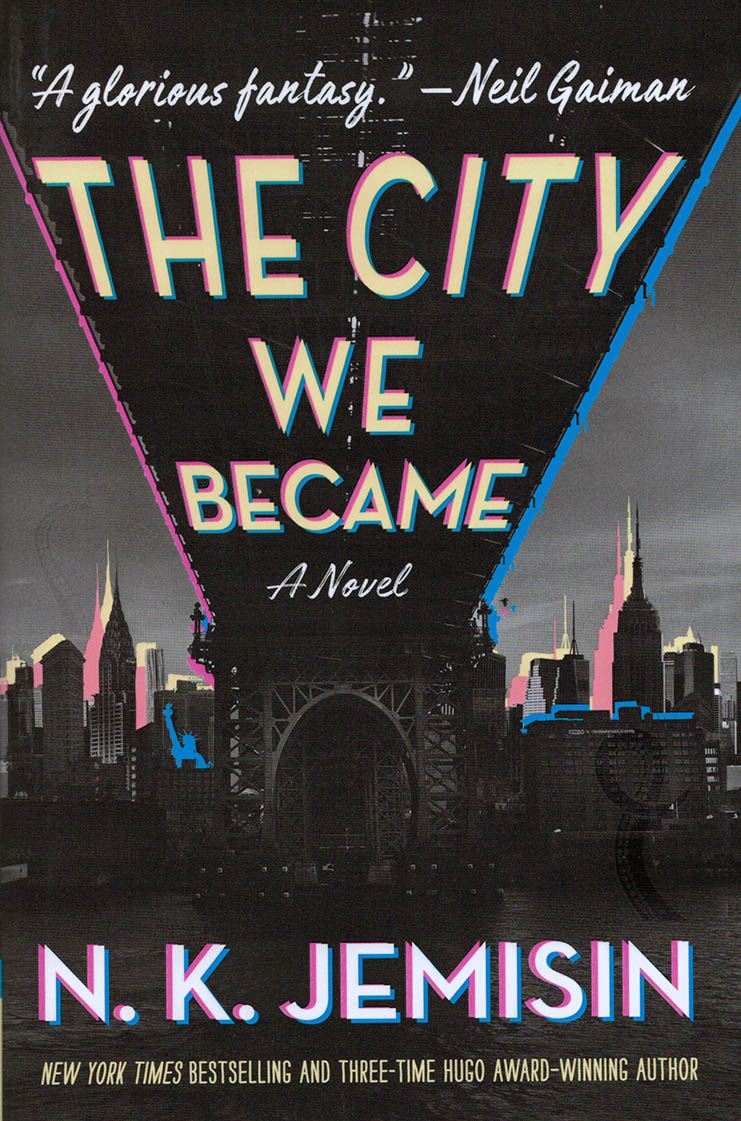
The City We Became
Three-time Hugo Award-winning and New York Times bestselling author N.K. Jemisin crafts her most incredible novel yet, a story of culture, identity, magic, and myths in contemporary New York City. In Manhattan, a young grad student gets off the train and realizes he doesn't remember who he is, where he's from, or even his own name. But he can sense the beating heart of the city, see its history, and feel its power. In the Bronx, a Lenape gallery director discovers strange graffiti scattered throughout the city, so beautiful and powerful it's as if the paint is literally calling to her. In Brooklyn, a politician and mother finds she can hear the songs of her city, pulsing to the beat of her Louboutin heels. And they're not the only ones. Every great city has a soul. Some are ancient as myths, and others are as new and destructive as children. New York? She's got six.
N. K. Jemisin is the first author in history to win three consecutive Best Novel Hugo Awards, all for her Broken Earth trilogy. Her work has also won the Nebula, Locus, and Goodreads Choice Awards. She has been a reviewer for the New York Times Book Review, and an instructor for the Clarion and Clarion West writing workshops. In her spare time, she is a gamer and gardener, and she is also single-handedly responsible for saving the world from King Ozzymandias, her dangerously intelligent ginger cat, and his phenomenally destructive sidekick Magpie.
Published March 2020
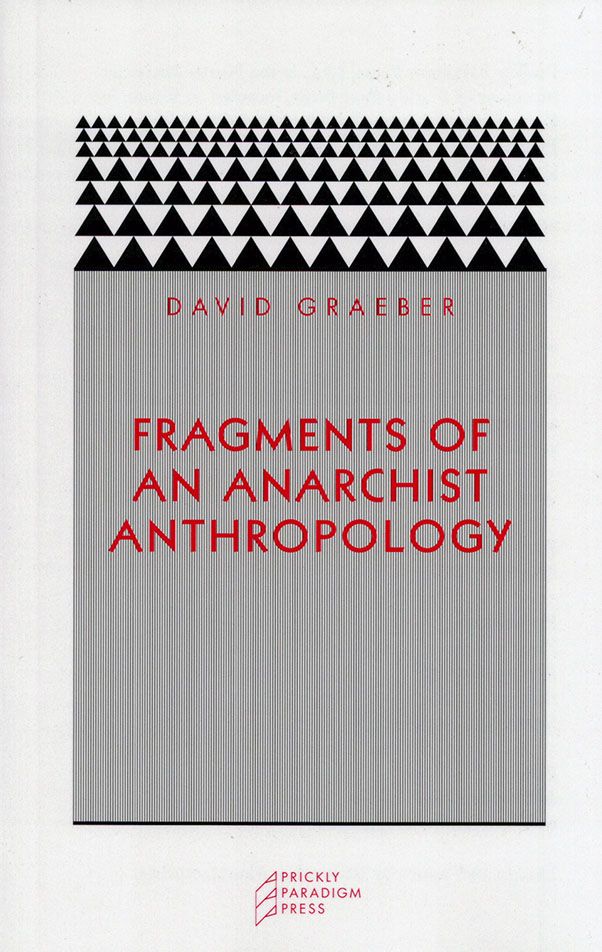
Fragments of An Anarchist Anthropology
Everywhere anarchism is on the upswing as a political philosophy—everywhere, that is, except the academy. Anarchists repeatedly appeal to anthropologists for ideas about how society might be reorganized on a more egalitarian, less alienating basis. Anthropologists, terrified of being accused of romanticism, respond with silence . . . . But what if they didn't?
This pamphlet ponders what that response would be, and explores the implications of linking anthropology to anarchism. Here, David Graeber invites readers to imagine this discipline that currently only exists in the realm of possibility: anarchist anthropology.
David Graeber (1961-2020) was an American anthropologist and activist. He was a professor of anthropology at the London School of Economics and a leading figure in the Occupy Wall Street movement. His books include Toward an Anthropological Theory of Value: The False Coin of Our Own Dreams, Lost People: Magic and the Legacy of Slavery in Madagascar, and Debt: The First 5000 Years.

The New Atlantis
Three short novels by some of science fiction's greatest writers - Ursula K. Le Guin, James Tiptree, Jr., and Gene Wolfe, edited by Robert Silverberg.
The New Atlantis, by Ursula K. Le Guin: In a dark near-future, global warming and a ruined ecology is causing the continents to sink into the oceans just as the towers of Atlantis re-emerge above the sea. Locus award winner and Hugo finalist.
Silhouette, by Gene Wolfe, and A Momentary Taste of Being, by James Tiptree, Jr., present two different masterpieces on a similar theme: A deep-space colony exploration ship approaches their target planet, where they must investigate whether or not it's hospitable enough to signal Earth to send more colonists. Things are not as they seem... Nebula / Locus award finalist stories.
Three of science fiction's most gifted writers-winners of Hugos, Nebulas, and a National Book Award-unleash their imaginations to present startling glimpses of humanity's future on Earth and in space. Blended into that future are age-old mysteries of the human psyche, mythicized fragments of the past, and the eternal question of biological purpose.
In "Silhouette" Gene Wolfe creates a self-contained world, an immense starship on a multi-generational mission to assure continuation of the race by colonizing the stars. It is a world, devised and constructed through man's technical genius, that comes to be threatened by the primitive superstitions and petty jealousies carried into space by the very technicians who serve in science's most ambitious project. The salvation of the mission and of the hundreds of lives bound to it comes to depend on a curious interplay of technology and occult human abilities.
Ursula Le Guin remains earthbound, but on a "brave, new world" where a bureaucratic tyranny proves less and less able to cope with supplying the needs of a burgeoning population. A subtle irony pervades her story, "The New Atlantis." Even as government strives to assure permanence of control, geologic upheavals awaken a haunting racial memory of antediluvian civilizations and grandeur long buried beneath the seas.
James Tiptree, Jr., confronts a disciplined space crew with humanity's first encounter with a wholly alien life form. Here again the survival of the human race depends on successful location of a new planet where mankind can establish its society with renewed vigor. But out of the questions of how to survive any threat that may be posed by an unknown life form arises a more central question: Is it intended that humanity survive?
Published August 2020

Experiments in Joy
Gabrielle Civil's Experiments in Joy celebrates black feminist collaborations and solos in essays, letters, performance texts, scores, images, and more. Following her explosive debut Swallow the Fish, Civil now documents her work with From the Hive, No. 1 Gold, and Call & Response—whose collaborative Call inspired the title. The book also features her solo encounters with artists and writers, ancestors and audiences. Here you will find black girlhood, grief, ghosts, girls in their bedrooms, lots of books, dancing, reading, falling in love, fighting back, and flying. With lots of heart and the help of her friends, Civil keeps reckoning with performance, art and life.

Clay's Ark
A gripping tale of survival as an alien pandemic irrevocably changes humanity, from the critically acclaimed author of Parable of the Sower. In a violent near-future, Asa Elias Doyle and her companions encounter an alien life form so heinous and destructive, they exile themselves in the desert so as not to contaminate other humans. Resisting the compulsion to infect others is mental agony, but succumbing would mean relinquishing their humanity and free will. Desperate, they kidnap a doctor and his two daughters as they cross the wasteland — and, in doing so, endanger the world.
OCTAVIA E. BUTLER was a renowned writer who received a MacArthur "Genius" Grant and PEN West Lifetime Achievement Award for her body of work. She was the author of several award-winning novels including Parable of the Sower, which was a New York Times Notable Book of the Year, and was acclaimed for her lean prose, strong protagonists, and social observations in stories that range from the distant past to the far future. Sales of her books have increased enormously since her death as the issues she addressed in her Afrofuturistic, feminist novels and short fiction have only become more relevant. She passed away on February 24, 2006.
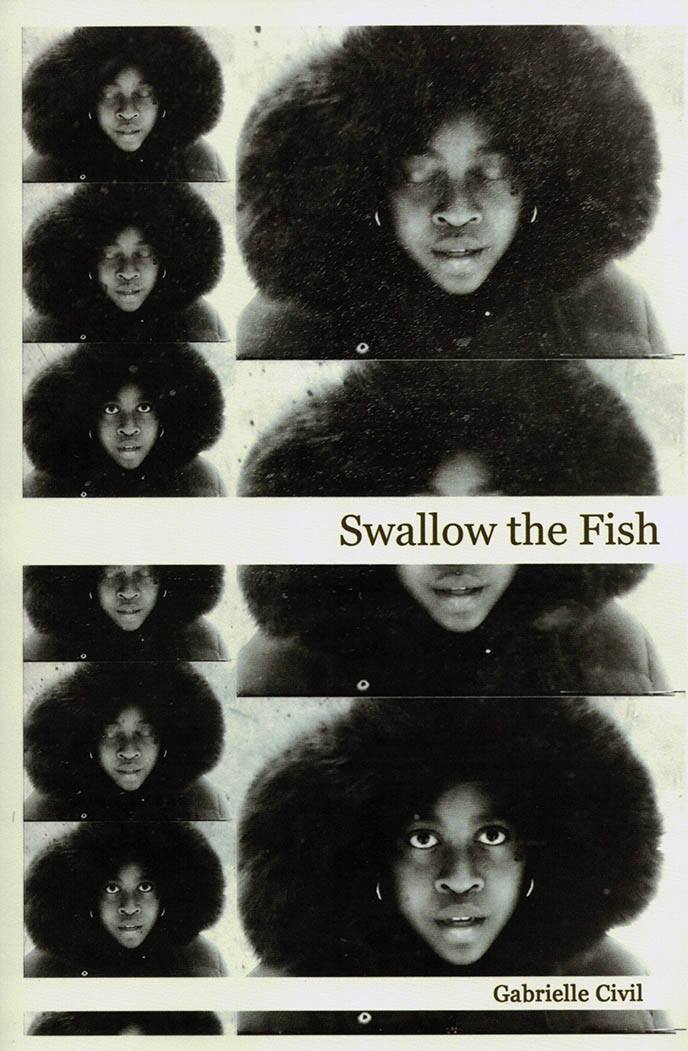
Swallow the Fish
Gabrielle Civil's Swallow the Fish is a memoir in performance art that explores the medium from within its beating heart. Adding its voice to black feminist conversations, it combines essays, anecdotes, and meditations with original performance texts to confront audience, motivation, and fears. Both joy and panic appear in Civil's world of performance, where neither walls nor city limits set the scope of the stage. Civil bares vulnerabilities and enthralls readers, asking essential questions and embodying dreams.
Published 2017.